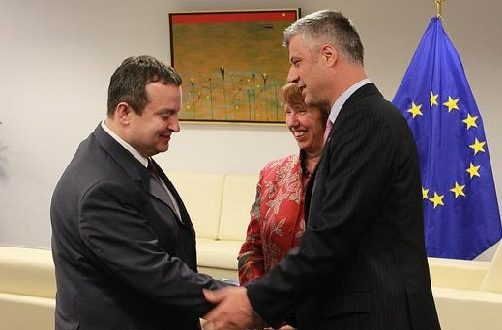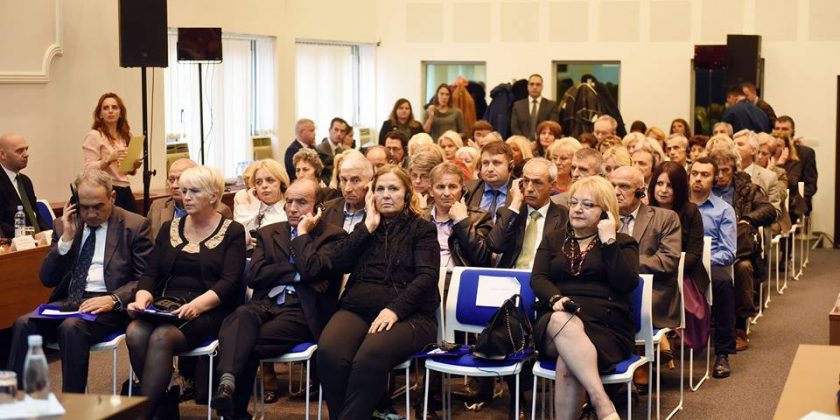Justice
Serbia and Kosovo reached the First Agreement of Principles Governing the Normalization of Relations (known as to the Brussels Agreement) on 19 April 2013.
Through this agreement, among others, they laid down the basis for the integration of Serb parallel judicial authorities of the northern municipalities, into Kosovo’s system.
For many years, Kosovo has struggled to ensure the operation of its judicial institutions throughout the whole territory, because Serbia runs – justice institutions operated in northern municipalities until recently. Hence, to end their operation and to ensure an effective and well-organized justice system, in the whole territory, Serbia and Kosovo reached another agreement on Justice, on 9 February 2015.
In line with this arrangement, the Mitrovicë/a region would have one Basic Court, one Basic Prosecution Office and a division of the Court of Appeals.
The Basic Court would have two premises; the one in North Mitrovicë/a (with 14 Serb and 10 Albanian judges and 80 support staff) and the one in South Mitrovicë/a (with 14 Albanian and 11 Serb judges and 80 support staff). These premises have four branches: Zubin Potok, Leposavič/Leposaviq, Skenderaj, Vushtrri.
- The north premises would comprise of: the Department for Serious Crimes for the entire Mitrovica/ë region (with 4 Kosovo Serb and 4 Kosovo Albanian judges) and the part of the General Department that adjudicates overall criminal offenses for Mitrovicë/a north, Mitrovicë/a South and Zvečan/Zveçan.
- The south premises, on the other hand, would comprise of: the Department for Minors for the entire region and the part of the General Department that adjudicates over civil matters, uncontested claims and minor offences for Mitrovicë/a north, Mitrovicë/south and Zvečan/Zveçan. The President of the Basic Court is a Kosovo Serb.
The Appellate Court in Pristina will establish a panel of a majority of Kosovo Serb judges to deal with Kosovo Serb-majority municipalities and a division of Appellate court will sit permanently in North Mitrovicë/premises (with 5 Kosovo Serbs and 2 Kosovo Albanian judges).
As for the prosecutor’s office, it covers the municipalities of South Mitrovicë/a, North Mitrovicë/a Zvečan/Zveçan, Vushtrri, Skenderaj, Zubin Potok and Leposavič/Leposaviq (with 9 Serbs and 9 Albanians with 24 support staff each).
The chief prosecutor of Mitrovicë/a Basic Prosecution Office, located in North Mitrovicë/a, is a Kosovo Albanian.

The parties further agreed regarding the pension and health insurance for the Serb- judicial personnel, integrated in the Kosovo institutions. Accordingly, Serbia continues pension and health contributions to the judicial staff that would be integrated into the Kosovo judicial institutions, on the condition that on the day of their appointment into the Kosovo institutions, Serbia would dismiss the same judges and prosecutors and would stop paying their salaries. In this regard, the Government of Serbia issued a decree by which judges, prosecutors and support staff were included in their earlier retirement scheme, and thus proclaimed no longer active in the Serbian Justice System.
In March 2015, Kosovo Prosecutorial Council (KPC) and Kosovo Judicial Council (KJC) began the recruitment process, with the assistance of EULEX. Kosovo’s Ministry of Justice organized the bar exam; for the candidates who had to take it (Six Serb candidates).
The selected judges and prosecutors, before being decreed by the President of Kosovo had to:

Finally, in 2017:
- 40 Judges
- 13 Prosecutors and
- 149 administrative staff, were working for Kosovo judicial institutions.
A controversial topic still remains that of the state symbols of Kosovo. Clearly, Kosovo insisted to have them displayed in courthouses in the north, nonetheless for the sake of preventing security tensions, Kosovo had to abandon this intention.
The implementation of this agreement has:
- Increased sense of legal security in northern Kosovo;
- Improved protection of property rights for all communities; and
- Has established law and order throughout the territory.
But, when it comes to the functionalization, these institutions still face many challenges.



